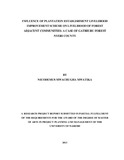| dc.description.abstract | This study was intended to establish the influence of Plantation Establishment Livelihood Improvement Scheme (PELIS) on the livelihood of forest adjacent communities in Gathiuru forest Nyeri County. PELIS is a modified form of Taungya System or ‘Shamba’ System which for a long time has been used by the Government of Kenya to raise forest plantation where the forest adjacent communities’ benefit from cultivation of food crops in the forest and the forest authority benefit from establishment of forest plantation at a low cost. The system has been receiving opposition from environmental pressure groups alleging that PELIS exploits farmers. The purpose of this study was therefore to assess the influence of PELIS on the livelihood of forest adjacent communities. The objectives of the study were: To examine how community participation in PELIS activities influence the livelihood of forest adjacent communities, to establish the extent to which PELIS benefits influence the livelihood of forest adjacent communities, to assess how community attitudes towards PELIS influence the livelihood of forest adjacent communities and to determine the influence of PELIS challenges on the welfare of forest adjacent communities. The research questions were: how does community participation in PELIS activities influence livelihood of forest adjacent communities? To what extent do PELIS benefits influence livelihood of forest adjacent communities? How does community attitudes towards PELIS influence livelihood of forest adjacent communities? How do PELIS challenges influence livelihood of forest adjacent communities? Descriptive research design was used in this study and the study population was the 1,500 registered farmers participating in PELIS. Stratified random sampling was used to draw a sample size of 150 respondents who were administered with questionnaires to collect the data. The final data was analyzed using statistical package for social scientists (SPSS). The study found out that participating in PELIS activities diversifies sources of livelihood and enhanced both social and human capitals. PELIS farmers were able to produce an average of 87 bags of potatoes per acre per year which enhanced food security and PELIS crops produced contributed 39% of the household income. Communities had a positive attitude towards PELIS. However, limited forest land for cultivation, poor forest roads and wildlife damage were some of the PELIS challenges which had negative influence to their livelihood. In conclusion the study established to some extent that PELIS had a positive influence on the livelihood of forest adjacent communities. The scheme diversifies sources of livelihood, enhances social and human capital and generates livelihood outcomes in the form of more adequate income, increased wellbeing, improved food security which enhances peoples living conditions or enable them reduce poverty levels. The study recommends the fencing of plantation areas to reduce wildlife damage, maintain forest roads regularly, harvest mature forest plantation to sustain the scheme and KFS to appreciate the PELIS farmers by providing them with some incentives. | en |

